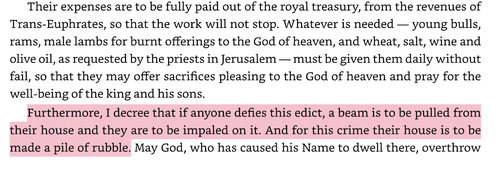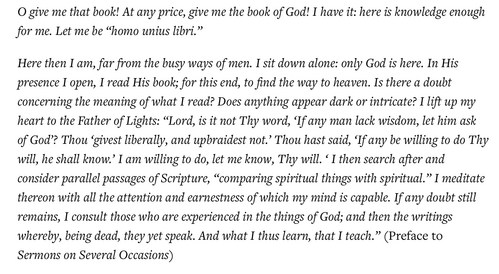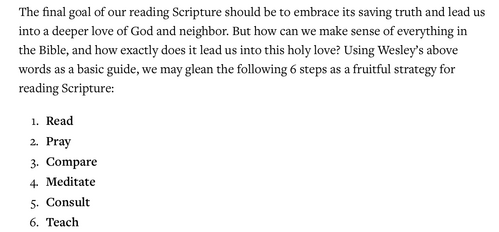The Story - Chapter 19
I was reading Chapter 19, minding my own business, when the following verse literally made me stop and say, “Huh?” (Ezra 6:11)

This verse was so jarring that I actually stopped reading and went to my notes from my Old Testament class in seminary to see if Dr. Fuller had covered it. (She had not… unsurprisingly!)

Scripture is filled with verses like this—passages that challenge our sensibilities and make us wonder how we should, or even if we should, try to live out biblical mandates. How do we make sense of them? In the preface to his collection of sermons for the early Methodist movement, John Wesley provided guidance on how to engage with Scripture. His approach can help us here:

Andrew Dragos interprets Wesley’s words this way:

Using Wesley’s instructions, here’s my attempt at understanding and applying Ezra 6:11 today:
1. Read: The first step is to simply read the text in context in a bigger picture. Ezra 6 recounts King Darius’ decree, reaffirming an earlier order by King Cyrus allowing Jewish exiles to rebuild the temple in Jerusalem. In verse 11, Darius underscores the seriousness of his edict: anyone who opposes it will face brutal consequences.
2. Pray: The severity of Ezra 6:11 is unsettling. We pause and ask God to help us see its purpose within the larger biblical narrative and its relevance for our lives today.
3. Compare: Darius’ decree seems extreme, but it aligns with Persian legal customs, where severe punishments maintained order. (Remember Chapter 18 in The Story, when Daniel was thrown into the lion’s den by King Darius?) Yet elsewhere in Scripture, we see God moving through human rulers for His purposes: “In the Lord’s hand the king’s heart is a stream of water that he channels toward all who please him.” (Proverbs 21:1) The temple’s reconstruction wasn’t due to Darius’ threat of violence but to God’s providence.
4. Meditate: Again, we pause and reflect: what does this passage reveal about God’s nature? The severity of Darius’ decree can distract us, but the greater truth is that God is sovereign over the affairs of nations. Ezra 6:22 confirms this for me: “For seven days they celebrated with joy the Festival of Unleavened Bread, because the Lord had filled them with joy by changing the attitude of the king of Assyria so that he assisted them in the work on the house of God, the God of Israel.”
5. Consult: John Wesley encouraged Methodists to seek wisdom from the Church’s consensual understanding of Scripture. One example comes from Cokesbury’s Basic Bible Commentary (thanks to Glenna Cleek for donating these to the church!): “It was not Darius who, on his own, decreed that the temple be rebuilt, but the Lord, the God of Israel and the God of the whole world, who turned the heart of the king to be favorable toward the Israelites.” (p. 36)
6. Teach: What can I take from this passage and share with others? I recognize that God works through history in ways we may not fully understand. Darius’ decree was severe, but it was God—working through an unlikely ruler—who ensured the temple’s reconstruction.
My thoughts are not authoritative, only Scripture is, so take this with a grain of salt! I’d love to hear your thoughts on how you interpret Ezra 6:11.
1. Read: The first step is to simply read the text in context in a bigger picture. Ezra 6 recounts King Darius’ decree, reaffirming an earlier order by King Cyrus allowing Jewish exiles to rebuild the temple in Jerusalem. In verse 11, Darius underscores the seriousness of his edict: anyone who opposes it will face brutal consequences.
2. Pray: The severity of Ezra 6:11 is unsettling. We pause and ask God to help us see its purpose within the larger biblical narrative and its relevance for our lives today.
3. Compare: Darius’ decree seems extreme, but it aligns with Persian legal customs, where severe punishments maintained order. (Remember Chapter 18 in The Story, when Daniel was thrown into the lion’s den by King Darius?) Yet elsewhere in Scripture, we see God moving through human rulers for His purposes: “In the Lord’s hand the king’s heart is a stream of water that he channels toward all who please him.” (Proverbs 21:1) The temple’s reconstruction wasn’t due to Darius’ threat of violence but to God’s providence.
4. Meditate: Again, we pause and reflect: what does this passage reveal about God’s nature? The severity of Darius’ decree can distract us, but the greater truth is that God is sovereign over the affairs of nations. Ezra 6:22 confirms this for me: “For seven days they celebrated with joy the Festival of Unleavened Bread, because the Lord had filled them with joy by changing the attitude of the king of Assyria so that he assisted them in the work on the house of God, the God of Israel.”
5. Consult: John Wesley encouraged Methodists to seek wisdom from the Church’s consensual understanding of Scripture. One example comes from Cokesbury’s Basic Bible Commentary (thanks to Glenna Cleek for donating these to the church!): “It was not Darius who, on his own, decreed that the temple be rebuilt, but the Lord, the God of Israel and the God of the whole world, who turned the heart of the king to be favorable toward the Israelites.” (p. 36)
6. Teach: What can I take from this passage and share with others? I recognize that God works through history in ways we may not fully understand. Darius’ decree was severe, but it was God—working through an unlikely ruler—who ensured the temple’s reconstruction.
My thoughts are not authoritative, only Scripture is, so take this with a grain of salt! I’d love to hear your thoughts on how you interpret Ezra 6:11.
Recent
Archive
2025
January
2024
August
October
Categories
no categories

No Comments